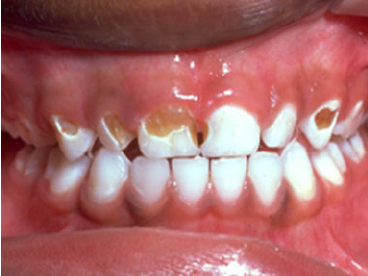
EARLY CHILDHOOD CARIES- A MAJOR PUBLIC HEALTH CONCERN IN CHILDREN! THE GOOD NEWS IS THAT IT IS PREVENTABLE.
If your child who is less than six years old has a cavity in one or more teeth, has teeth missing due to the presence of a cavity or has already had teeth filled due to being cavitated he/she is considered as having early childhood caries (ECC). Even more concerning is severe early childhood caries which is the term used to describe caries (cavities) seen in children 3 years and younger. Some readers might be more familiar with the terms ‘nursing bottle caries‘ or ‘baby bottle tooth decay‘. Both of these terms were formerly used to refer to early childhood caries.
What causes ECC?
Sugar is your child’s teeth worst enemy. Sugar is found in milk, juice and many of the cereals and foods young children are allowed to consume. If sugary foods and liquids are left in your child’s mouth for hours on end the bacteria in the mouth uses the sugar to produce acid. Over a period of time, the continuous acidic environment inside your child’s mouth eventually destroys your child’s teeth.
Other risk factors are:
- poor oral hygiene
- bacterial transmission from caregiver to child through saliva contact
- frequent between meals consumption of foods and drinks high in sugar
- child patients who are chronically ill or have certain medical and/or dental conditions which require a constant intake of medication
- night time bottle feeding with juice
Parents and caregivers, please note that although ECC may not arise from breast milk alone, breastfeeding in conjunction with other carbohydrates has been found in vitro to be highly cariogenic.
Prevention of Early Childhood Caries
To decrease your child’s risk of developing ECC, the following preventive measures are encouraged:
- Avoid frequent consumption of sugar-sweetened beverages in a baby bottle or sippy cup and only give your child the bottle during meals. If your child wants the bottle constantly during the day and night ensure only water is in the bottle or sippy cup.
- Avoid breastfeeding after the first primary tooth has erupted and other dietary carbohydrates are introduced.
- Adopt a healthy balanced diet, limiting sugary snacks especially sugary snacks that can easily stick into the fissures of the teeth. Sticky foods such as raisins and some dried fruit can increase the risk of developing cavities.
- Give your child sugar-free medication when required.
- Parents, please minimise saliva sharing activities such as cleaning pacifiers with the mouth and sharing utensils.
- Clean your baby’s gums with a soft cloth and water starting at birth. The brand ‘Baby Buddy’ https://www.amazon.com/Baby-Buddy-Tissues-Toddler-Bubble/dp/B00ME4718Y?th=1 has dental wipes that can be used for this same purpose. On eruption of the first tooth, a soft toothbrush must be used twice daily. A ‘smear’ of toothpaste is used for children under two years of age and a ‘pea-size’ amount used for children between two and five years. Your child’s caries risk will dictate the use of fluoridated toothpaste. This is also determined by your child’s Paediatric Dentist or Paediatrician.
- Avoid dipping pacifiers in any sweetened liquid.
- Your child should be taught to start drinking from a cup preferably before the age of one year. This prevents liquid from stagnating around the front teeth.
- Take your child to a pediatric dentist or a child-friendly dentist for an early check-up by their first birthday. At this visit, the risk of your child developing cavities can be discussed and measures put in place to prevent them from occurring.
REFERENCES